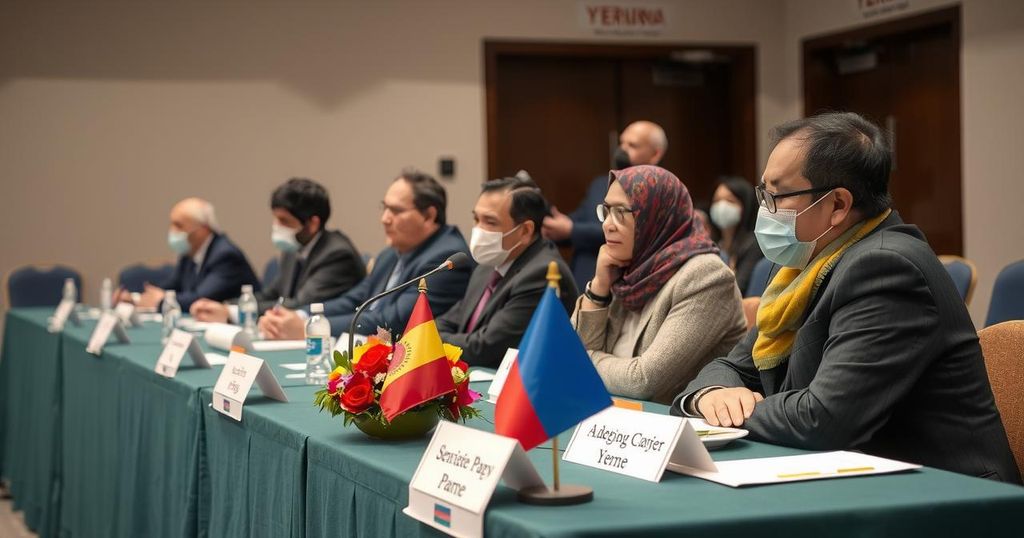Yerevan Forum Strengthens Global Genocide Prevention Efforts

The 5th Global Forum Against the Crime of Genocide in Yerevan focused on enhancing early warning systems and preventative measures against potential mass atrocities. High-ranking officials and experts discussed the importance of international cooperation, the role of small states, and the use of technologies in addressing contemporary challenges related to hate speech and disinformation.
On December 12 and 13, Armenia’s capital, Yerevan, hosted the 5th Global Forum Against the Crime of Genocide, gathering high-ranking officials, experts, and scholars from various fields. The forum, entitled “Strengthening the Effectiveness of International Mechanisms for Early Warning and Early Response to the Risk of Genocide and Other Atrocity Crimes,” aimed to explore early warning indicators and preventative measures against genocide, highlighting both the pivotal role of small states and instances of serious human rights violations.
The event featured varied panel discussions on critical topics, including gaps in legal frameworks regarding international crimes and the mechanisms required for timely alerts about potential mass crimes. President Vahagn Khatchaturyan and Minister of Foreign Affairs Ararat Mirzoyan opened the forum, emphasizing Armenia’s proactive stance, shaped by its historical context as a nation descended from survivors of the Armenian Genocide.
In his remarks, President Khatchaturyan noted, “Since its independence…Armenia has undertaken a leading role in international multilateral platforms in advancing issues of genocide prevention, punishment, and commemoration of victims.” Minister Mirzoyan stressed the necessity of international collaboration for protecting diverse groups under the human rights framework, asserting, “The only guarantee of success…is close international cooperation.”
A message from UN Secretary-General Antonio Guterres advocated for the enhancement of preventive strategies, underlining the importance of education in combatting hate speech and misinformation that could incite genocidal actions. Guterres stated, “We must respect and implement decisions of the International Court of Justice on the application of the Convention.”
The forum concluded with remarks from Deputy Minister of Foreign Affairs Vahan Kostanyan, who acknowledged the indispensable role of small states in genocide prevention and reiterated that, “We are the international community, and we are the ones who should apply international law.” Participants represented a broad spectrum of stakeholders, including governmental representatives, UN officials, civil society organizations, and academic institutions.
The Yerevan Declaration of Joint Action, from the previous Global Forum, guided discussions and emphasized the relevance of the 1948 Genocide Convention. It also acknowledged emerging technologies’ dual capacity to serve as both risk factors for spreading extremist ideology and tools for early detection of atrocities. Concerns about the detrimental impact of online hate speech and misinformation on social media were paramount, with calls to foster a safer digital environment and improve media literacy among citizens.
The Yerevan forum represents a critical gathering aimed at refining global strategies for genocide prevention. This event not only underscores Armenia’s historically influenced role within such discussions but also serves as a platform for addressing contemporary challenges posed by modern technologies. Recognizing early warning signs and enhancing international cooperation among states and organizations are paramount to effective risk management concerning potential atrocities.
The Yerevan Forum Against the Crime of Genocide successfully highlighted the urgency of enhancing preventive measures against potential genocides and mass atrocities. Leaders and experts collectively recognized the importance of early warning systems, international collaboration, and the impact of digital platforms in shaping public discourse. The discussions culminated in a reassertion of the commitment to uphold human rights and leverage technology to foster stability and peace within societies.
Original Source: www.dailynewsegypt.com








